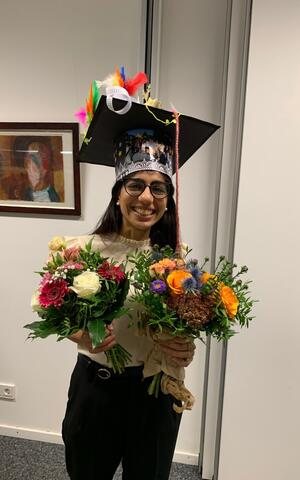Graduation ceremony 2020: Keep at it!
Coronavirus has changed everything this year, and that included the graduation ceremony for the nine doctorands at the Max Delbrück Center for Molecular Medicine in the Helmholtz Association (MDC). On 4 December 2020, instead of gathering in a ceremonially decorated hall, they sat in front of their computers – whether in a home office, living room, office at work, or even the lab, with colleagues in face masks passing by in the background. Some 50 guests from all over the world joined in the event: family and friends from Germany, Pakistan, Switzerland, the UK, Serbia and Dubai. You might think it would be less celebratory than usual. But in spite of the physical distance – or perhaps even because of it – the virtual ceremony created an exceptional sense of closeness between the researchers, their guests and their professors.
Surprising questions – surprising answers
With this highest of academic degrees under your belt, you have more career opportunities open to you than other graduates.
This was partly thanks to an online survey carried out at the start of the ceremony, which revealed a few surprises. For example, the graduates’ favourite spots in Berlin included not only Prenzlauer Berg and the Brandenburg Gate, but also Bernau and the Klunkerkranich cultural roof garden in Neukölln. Childhood hobbies included martial arts, Lego and jigsaws, while today they prefer jogging, cooking and reading. In six months, most see themselves in Berlin, Switzerland and the UK, with one or two also dreaming of Bora Bora. In three words, doing your doctoral degree is “fun and friends” and “challenging – exciting – successful”, but also “suffering – horror – pain”.
But no matter how the young researchers described their thesis, “With this highest of academic degrees under your belt, you have more career opportunities open to you than other graduates. You could not be better placed,” said Professor Michael Gotthardt, who presided over the ceremony. He proved himself to be a film lover of the highest order, his honorific speech combining words of praise and a movie quiz in one. No matter where a researcher’s career took them, he said: “Keep at it, keep developing, think outside the box.”
Four winners of the PhD Publication Prize
One thing didn’t change, because, as is the case every year, the best papers were honoured with the PhD Publication Prize, sponsored by the Friends of MDC and the Dr. Pritzsche Foundation. Two winners were awarded the €1,000 prize money.
Monika Litvinukova from the Experimental Genetics of Cardiovascular Diseases lab, led by Professor Norbert Hübner, was honoured for her research on the Human Heart Cell Atlas. Hübner started up the project three years ago together with researchers at the Wellcome Sanger Institute in Cambridge (UK), Harvard Medical School in Boston and Imperial College London. The researchers published a first draft of their heart atlas in Nature earlier this year: “It was a tremendous effort by many participating teams,” sums up the award winner, who was one of the first authors. In total, 33 researchers from 19 research institutes in Germany, the UK, the USA, Canada, China and Japan were involved in the paper. They analysed approximately half a million individual cells and cell nuclei in the human heart, discovering previously unknown subtypes of heart muscle cells and supporting heart cells, protective immune cells and a widely branching network of blood vessel cells. The researchers also worked out how the cells communicate to keep the heart functioning.
Another coveted award is for the most beautiful doctor's hat. This year's winner is Rabia Anwar.
The second winner was Maria Ercu from the Anchored Signalling lab, led by Dr. Enno Klussmann. Together with 40 researchers based in Berlin, Bochum, Limburg, Toronto (Canada) and Auckland (New Zealand), the MDC group, publishing in the journal Circulation, discovered the cause of a hereditary form of hypertension. In so doing, they laid the foundation for more effective treatments for this common disease. In this particular form, named Bilginturan syndrome after its Turkish discoverer, shortened fingers are associated with extremely high blood pressure. Scientists at the MDC have been studying this condition for decades. It has been known for a long time that people with the disorder carry a mutated gene in their genetic make-up. For the first time, it has now been shown that this gene causes an enzyme called phosphodiesterase 3A (PDE3A) to become more active than normal. PDE3A regulates both bone growth and blood pressure. The researchers worked with mice in whose vascular wall cells the human enzyme PDE3A was overactive. These mice had significantly higher blood pressure compared with control animals. Using CRISPR/Cas9, they also modified a region of the mutated PDE3A gene in a rat model. As a result, the animals not only had raised blood pressure but also much shorter toes on the forelimbs.
Doctoral researchers Jan Möller and Ricardo Paricio-Montesinos shared second place, with an award of €250 each. As part of the Signalling Processes of Receptors group, Jan Möller investigated through which signalling pathways in the brain the effects and side-effects of opioids occur. Until now it seemed impossible to separate effects and side-effects from each other. However, the research team succeeded in localising individual receptors on the outer membrane of nerve cells. What’s more, they were able to observe how the receptors react to different opioids. “This could be the starting point for the development of new painkillers with fewer side-effects,” says Möller. The team published their findings in Nature Chemical Biology.
With a research team from the Neural Circuits and Behaviour lab led by Professor James Poulet and the Molecular Physiology of Somatic Sensation group headed by Professor Gary Lewin, Ricardo Paricio-Montesinos demonstrated that mice without cold receptors in their skin cannot perceive warmth. The researchers made this discovery by chance while investigating the animals’ ability to perceive slight changes in temperature. Previously, neuroscientists had assumed that special signalling pathways conveyed either warm or cold stimuli from the skin to the brain. They published their results in the journal Neuron.
Text: Jana Ehrhardt-Joswig
Further information
- An in-depth atlas of the heart
- Not all hearts are the same
- Overactive enzyme causes hereditary hypertension
- Changing how we think about warm perception
- From a rare form of high blood pressure to new approaches to a global epidemic
- A receptor with addictive potential
- New PhD programs kick off at the MDC
- The Society of Friends of the MDC






